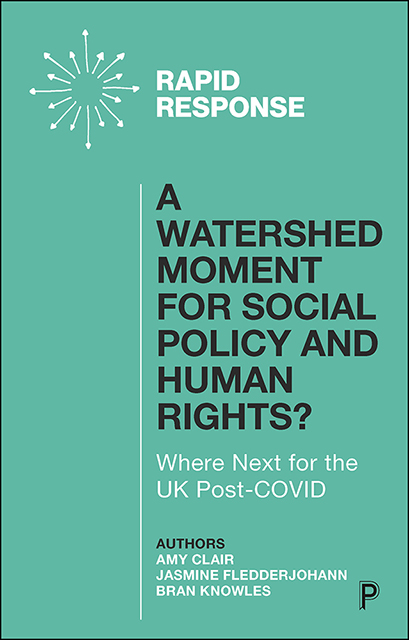6 - Where next for social policy?
Published online by Cambridge University Press: 21 April 2023
Summary
Through our examination of the failure of neoliberal states to fulfil the rights outlined in Article 25 of the UDHR, we have explored five key themes. First, COVID-19 represents a watershed moment for social policy and human rights. The pandemic should provide all the justification we need to finally tackle the structural bases of inequality. COVID-19 has unarguably had the most devastating and disproportionate impact on marginalised people. From health to food insecurity, housing to the digital divide, the reality that marginalisation is structurally violent is not unique to the pandemic. As with other disasters, a return to ‘normal’ is a return to a dysfunctional and harmful social system for marginalised people. Yet what is unique to this moment is that, because of its globally and nationally disruptive and devastating effects, COVID-19 has created precariousness in the lives of the ‘deserving’, perhaps cracking the rhetorical foundation upon which the flawed notion of meritocracy rests. That the pandemic may be a watershed moment is by no means guaranteed, however, as historical precedent favours this crisis being exploited by disaster capitalists to tighten the grip of neoliberalism on society. Our structurally violent, inequitable system will not right itself, and, as history has shown, it certainly will not be righted by market forces. If this is to be a watershed moment, we must reimagine our societal goals and then take proactive steps to meet new aims.
Relatedly, the second theme is that, in order for society as a collective human experiment to be worthwhile, human dignity and social justice should be prioritised over economic growth; the current neoliberal system holds the inverse to be true. As Ruha Benjamin says: ‘The nightmares that many are forced to endure are really the underside of elite fantasies about efficiency, profit, safety, and social control’ (VentureBeat, 2020). Across chapters, we have seen many examples of the harm caused by neoliberal narratives, as marginalised people are structurally relegated to the edges of society, labelled ‘unproductive’ and therefore ‘undeserving’, and then punished doubly for their relegation. This, as Grover (2019) asserts, is a form of social murder. That this situation is morally repugnant should in principle render it worthy of action in its own right. However, for those unswayed by moral principles, it is also worth noting that, as SRT shows, our current system of financialised capitalism is unsustainable.
- Type
- Chapter
- Information
- A Watershed Moment for Social Policy and Human Rights?Where Next for the UK Post-COVID, pp. 97 - 106Publisher: Bristol University PressFirst published in: 2023



